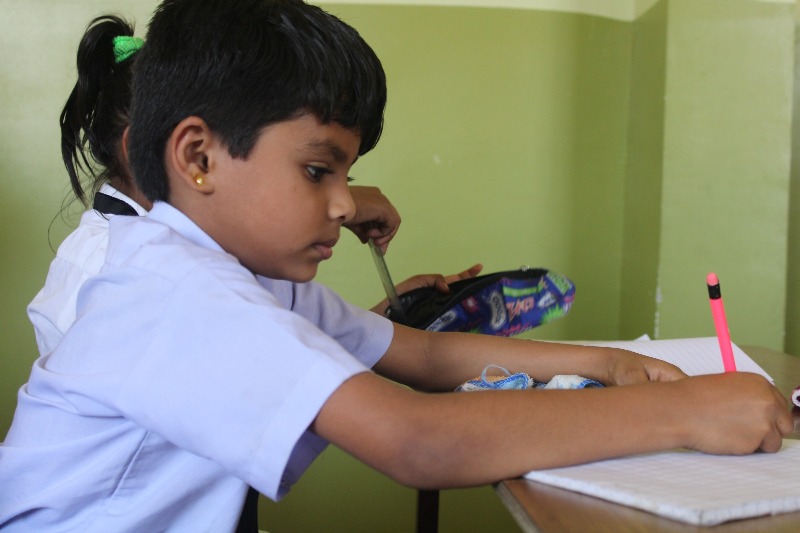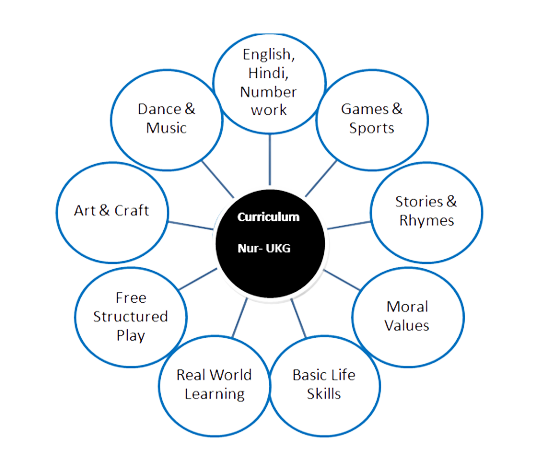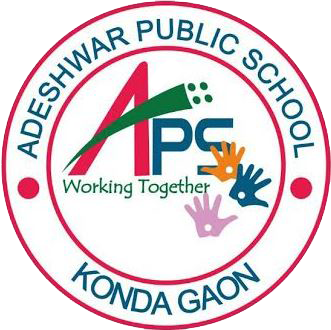Curriculum
The curriculum for the Pre-Primary section of Adeshwar Public School is to bring about the objective by reinforcing concepts, ideas, skills and activities at this stage not only from the teacher’s point of view but also for the parents to comprehend what is being done in the classroom.
The main thrust of our curriculum is based on innovative and creative activities in and outside the classroom. We have a well-planned pre-school program which consists of the following integrated project based activities:


Well Planned Pre School Program:
Teachers reinvent their teaching methods and make their classes interesting. We keep on introducing new methods to make the class live and interesting. Listed below are some of the strategies we follow.
CREATIVE TEACHING-
Taking the help of creative tools to stimulate creativity, we include playful games or visual exercises that excite the young minds and capture their interest. Also, this encourages them to come up with their ideas and gives them the freedom to explore.
These sessions are a great way to get the creative juices flowing with multiple brains focusing on one single idea to get numerous ideas involving everyone into discussions.
We link our lessons to real world learning infusing real world experiences. Relating and demonstrating to real life situations makes material easy to understand and learn. It sparks their interests and makes the sessions all the more interesting.
Our curriculum is structured to nourish the whole being-the mind, heart and body. So all the activities are creatively balanced with the subjects to bring about the best learning.
Our curriculum is structured to nourish the whole being-the mind, heart and body. So all the activities are creatively balanced with the subjects to bring about the best learning.
Some lessons are best learnt, when they are taught outside the classroom in the lap of nature. Children find it fresh and exciting and the learning remains forever with them.
Teaching through role play, story dramatisation, dance, music, rhymes are a great way to make children step out of their comfort zone and develop their inter personal skills.
Our curriculum is structured to nourish the whole being-the mind, heart and body. So all the activities are creatively balanced with the subjects to bring about the best learning.
It involves working with range of available evidences throughout the process of activities that enables the teacher to check the child’s performance and keep the track of one’s progress, identify the learning gaps, their strengths and weaknesses, anecdotes and help them overcome using various remedial strategies.
English, Hindi, Mathematics, Science, Social Science, Computer Education, third language (Sanskrit), General Knowledge and Moral Science.
Scholastic Assessment (Subjective)- The assessment structure and examination for classes Nur to X comprises of three terms :- Term-1, Term-2 & Term-3
- April : UT-1
- July : UT-2
- September : Term- 1
- November : UT-3
- December : Term-2
- February : UT-4
- March: Term-3
Curriculum Areas at Secondary Level:
For the purpose of fostering core competence in learners, the curriculum encompasses six major learning areas, which are: Languages, Humanities, Mathematics, Science, Computer Science. It refers to the content of learning, not the titles of subjects.
Major Contents of Each Curriculum Learning Area in Secondary Classes.
Languages include Hindi, English and focus on listening, speaking, reading and writing skills, along with developing effective communicating proficiencies
Humanities (Geography, History and Political Science) include the learning of history and culture, geographical environment, global institutions, constitutional values and norms, politics, interpersonal and societal interactions, civic responsibilities, and the incorporation of the above-mentioned learning into one’s life.
Science (Biology, Chemistry, Physics ) include gaining knowledge about matter and energy, nature, the environment, technology, breakthroughs in science. It will focus on knowledge and skills to develop a scientific attitude, use and application of such knowledge and skills to improve the quality of life and further use this learning to analyse, evaluate, synthesis, create, invent and discover.
Mathematics includes acquiring the concepts related to number sense, operation sense, computation, measurement, geometry, probability and statistics, the skill to calculate and organise, and the ability to apply this knowledge and acquired skills in their daily life. It also includes understanding of the principles of reasoning and problem solving.
In conclusion it can be said that school follows a well planned syllabus to nurture and guide the students.
